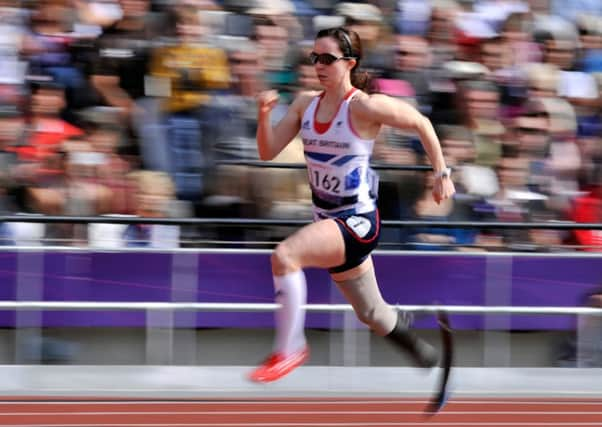Stef Reid takes the long view for Rio Legacy


Some nations will not send their intended complement due to delays in promised travel grants from the Rio 2016 organisers. Venues have been changed or even closed at short notice due to a vast budgetary shortfall. A fund-raising appeal has even been launched overseas to purchase tickets for impecunious Brazilians.
Much needed too. Early last week, one source told me that less than 200 seats had been sold for one of the most attractive athletics sessions. Just 59,800 to go. After the joyous jamboree of London 2012, when the public packed venues to the rafters and embraced disability sport, many sense a risk that the movement will take several steps back.
Advertisement
Hide AdAdvertisement
Hide AdStef Reid, however, begs to differ. “Without doubt, London was an absolute landmark event and it really did change the face of the Paralympics,” the long jumper – whose father is Scottish – said. “We’re having this in the midst of a difficult time for them. We heard so many different stories before leaving the UK.
“But even being here, we arrived at a small airport in Belo Horizonte – we’re a nightmare coming in as a large team with so much luggage – but in the midst of all that, we had passengers coming up saying, ‘It’s so great to have you here and best of luck’.”
It is important, she added, that these Games have come regardless. That society in Latin America can feel the impact and, perhaps, ignite a change. “That’s what’s important. You can’t measure a legacy in just seats.”
The 31-year-old is a potent and eloquent advocate for the cause, one reason why Channel 4 will welcome her into their punditry team when she polishes off her quest for gold on Friday. A sprint bronze medallist for Canada, where she was raised, in Beijing in 2008, and then the scorer of long jump silver for the UK four years ago, Reid has straddled an era that has seen the “other” Games edge from the sidelines into the spotlight, raising the bar on the level of ambition and commitment.
Even 12 years ago in Athens, this remained an event primarily for the hobbyists, squeezing in their training and competition in their spare time.
“Now we have professional athletes,” Reid acknowledged. Not everywhere, but step by step. “The widening of the base has really raised the level. And this thing keeps on building and building. It’s done wonders for us and this generation, having this kind of Paralympics, we are so, so lucky.”
The timing of its ascent was fortuitous indeed. She was 16, and a promising rugby player with international aspirations, when she was unexpectedly thrust on this alternative path. Scythed by a powerboat after tumbling into a lake outside Toronto, and bleeding badly, the price of survival was the surgical removal of her right foot.
A natural optimist, Reid was never going to drown in self-pity. Each day had always been about bettering the last. “That was a really hard period where I learnt those qualities don’t just relate to sport,” she said. “I could take them and apply them into other areas of my life. And I’d kind of accepted that perhaps sport wouldn’t be the focus.”
Advertisement
Hide AdAdvertisement
Hide AdThe competitive urges previously channelled on to the rugby pitch were diverted to academia. A degree in biochemistry was intended as the prelude to medical school and a career as a heart surgeon. One day, a few years after her accident, she sat watching an athletics session. “I felt myself asking the question: ‘How fast can you still run?’ I’d never really done track and field. But my feet were always my greatest asset.”
A trial turned into a temptation. Her results were so promising that she had to choose between a life of security or a leap of faith. “People thought I was crazy, that I could be a professional athlete with one foot. But I was curious. I thought, ‘Even if this blows up in my face, medical school will always be there but you’ll regret it if you don’t try’. So I just went for it.”
How prescient it was. Through athletics, she met her husband Brent Lakatos, who will wheelchair race for gold hours after his wife.
Then Reid will head for the TV studio, into living rooms with a platform to beat the drum. The Games, certainly, still feel like a magical opportunity.
“That’s the story of how I’ve ended up here,” she affirmed. “It’s not been easy. There have been a lot of tears and a lot of ‘What on earth are you thinking?’ But I’m incredibly excited to get on that field.”